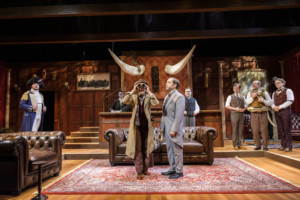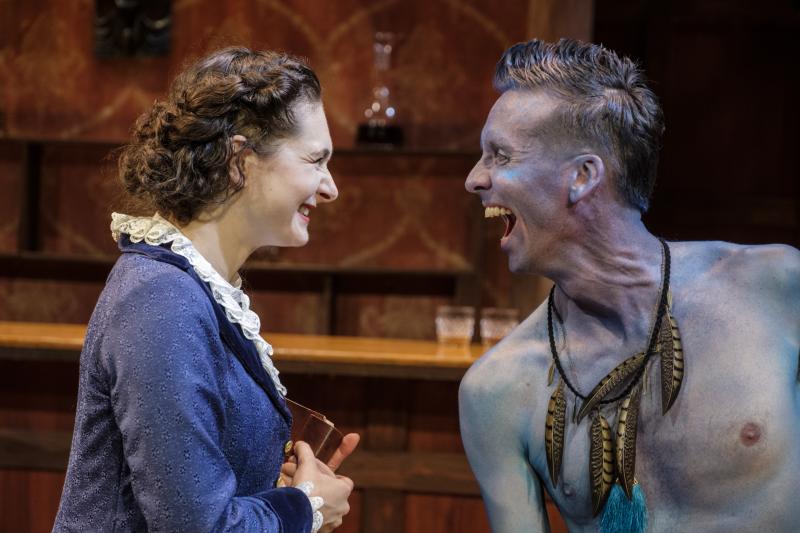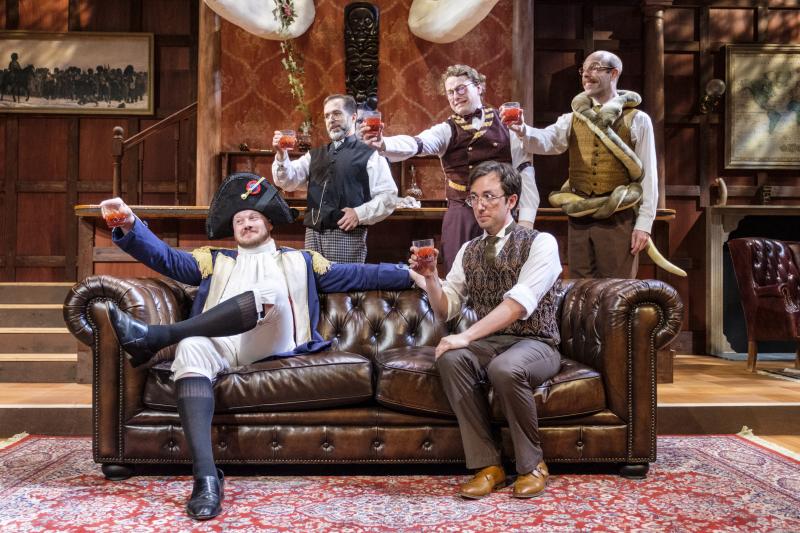Review: THE EXPLORERS CLUB at Prologue Theatre

The Prologue Theatre's inaugural season's latest feature is Nell Benjamin's The Explorers Club, a fun, witty satire about a Victorian-Era Explorers Club in London, which is devoted to science and the exploration of our world. Incredibly well-researched, the bitingly smart play examines the social norms of the time - clubs that excluded women based on their gender regardless of merit, social hierarchy in Victorian society, the exotification of other cultures, and the thrust of imperialism - and raises questions about our own society.
We are introduced to the Explorers Club as they open their annual meeting with a song, toasting to science (although the show is not a musical, there are two brief musical interludes that are quite entertaining and nicely display the actors' range). Two of the members, Professor Walling and Professor Cope, are due to present their latest findings to the Queen the next day; Walling has proven the intellect of his beloved guinea pigs (with the exception of the one dud, Jane, who remains in her cage after the others have mastered the latch and escaped), and Cope has discovered a new breed of snake, which he has named "Rosie" after his late mother (who may or may not be "late" due to her namesake). The two happily celebrate their victories, chortling over how "they said a man who studies predators and a man who studies prey couldn't be friends, but we proved them wrong!" The adorable stuffed animals and the smug satisfaction makes for a wonderful visual and foreshadowing for later events. Meanwhile, we are introduced to the other members of the club: Lucius, a timid botanist, is acting as President Pro Tempore while the club's president, Harry Percy, is off on an expedition to find the East Pole; he is eager to introduce a new scientist he hopes to propose for membership, Phyllida Spotte-Hume, whose presence riles up Biblical scientist Professor Sloane, who actively opposes allowing a woman into their sacred organization. Phyllida, however, is more than qualified for the club. She presents her findings after discovering a lost island tribe, and introduces the members to a tribal man she has brought back to present to the Queen at the next day's ceremony. The tribal man, nicknamed Luigi, is bare-chested, painted blue, and only semi-educated in English manners - he has learned to bow to the Queen, but also still slaps people in the face upon introductions, as is customary on his island. The men are impressed, but are still arguing about whether a woman can be admitted when Percy returns, the sole, triumphant survivor of his journey, and banishes Phyllida for the sacred manly tradition of brandy and cigars, over which he taunts Lucius about his obvious affection for her as well as Lucius' cautious, scientific manner. The next day, Walling, Cope, and Phyllida head off to the palace together as Sloane presents a controversial theory to the Irish Society. The resulting disasters of these events force the club to band together in a farcical attempt to avert greater catastrophe.

Although the script is excellently written, the presentation is what truly elevates this production. Co-directors Jason Tamborini and Noah Schaefer have a truly deep, thoughtful understanding not just of the play itself, but also of the social and political contexts of both Victorian and modern societies. Their careful attention to the underlying themes and implications is clear in each scene, and makes even the smallest moments ring with purpose. The program includes letters from both directors, and those notes help outline their vision, though the show is purposeful even without this lovely addition.
The excellent cast also deserves tremendous credit; each member is individually wonderful, and they work so well as an ensemble that it's easy to forget this is a scripted performance. Indeed, the script has a number of callbacks that could grow tiresome in the wrong hands, but the cast executes them so perfectly that they remain entertaining. Harrison Smith's Walling and Ryan Tumulty's Cope are a delightful pair, and the two actors are immensely fun to watch. Matthew Pauli's curmudgeonly Sloane is an entertaining foil to the rest of the club members' enthusiasm, and his stoic delivery of his outrageous theories makes them all the more humorous. Christopher Herring's Luigi manages to be a comical portrayal while poking fun at the society he has been dropped into rather than his own roots; Herring moves about the stage, examining the room with the fascination you'd expect from any anthropologist, and his quick - though patchy - study of English customs (such as how to tend bar) shows the absurdity of the expectations. On a related note, Herring and the entire cast deserve particular praise for the scenes when Luigi serves drinks; their dexterity is remarkable.
Percy and Lucius, in their battle for control over the society's direction and Phyllida's interest are a great show of contrasts. Despite the Explorers Club being an organization dedicated to science, the two display a sort of jock-nerd pairing: Percy is barely literate and prefers to act without thought or plans, while Lucius is a careful, deliberate planner who prefers to study without expectations of results. The power struggle between the two serves as both a thoughtful commentary and a comedic relief. Conversely, Zach Brewster-Geisz and Jack Novak are the actors whose characters are the least-developed, as they are more tertiary, fleeting characters. And yet, amidst the bombast of the rest of the cast, the two prove themselves more than capable of avoiding getting lost or overlooked; Novak's Beebe was particularly enjoyable, and Brewster-Geisz's straight delivery of some of the more ridiculous comments was admirable.
No evaluation of this production would be complete without addressing the incredible Ana DiGiovanni, whose Phyllida commands both the stage and the other characters' actions. DiGiovanni's leading lady is bright, but practical, and manages to play along with polite society's expectations while impatiently knocking on the glass ceiling - or, as is more often the case, pocket doors. She comes off as competent and caring, and has little patience for Percy's displays of machismo. DiGiovanni also pulls double-duty as Phyllida's twin sister, the Countess Glamorgan, and the contrast between the two characters is a humorous display of her range.

Matthew Pauli (Professor Sloane), Harrison Smith (Professor Walling), Ryan Tumulty (Professor Cope) Front Row, seated, Left to Right:
Nicklas Aliff (Harry Percy), Danny Cackley (Lucius Fretway)
Aiding the incredible cast and direction are Sydney Moore's wonderful period costumes, Cindy Landrum Jacobs' meticulous props, and JD Madsen's immersive scenic design. The overall effect is a great space that feels incredibly realistic, but also carefully displays the characters' traits even in the smallest ways; just by looking at the characters and the set, the audience immediately gets a sense of their personalities and the organization, and it makes the whole show much richer.
Prologue Theatre has managed to produce a show that is both immensely funny and immensely profound. The careful attention to detail and context pays off greatly, and the result is a wonderful experience for the audience.
Prologue Theatre's production of The Explorers Club plays at Gallaudet University's Eastman Blackbox Theatre through August 4th. The run time is approximately 90 minutes with one 10-minute intermission. Following the Sunday matinees, the cast and crew will hold a series of conversations about social and political topics raised by the show. For more information on tickets and the post-show conversations, please refer to the Prologue Theatre website.
All photos are courtesy of DJ Corey Photography.
Reader Reviews

Videos

